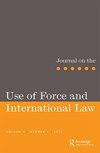推特和战争法:武力威胁和其他影响
Q3 Social Sciences
Journal on the Use of Force and International Law
Pub Date : 2019-07-03
DOI:10.1080/20531702.2019.1690269
引用次数: 0
摘要
最近的一份报告指出,97%的联合国成员国目前都有官方推特。该报告还强调了国家元首推特账户的激增,包括那些模糊了“国家”和“个人”鸿沟的账户。例如,自2017年1月美国总统上任以来,@realDonaldTrump账号的粉丝数量增加了一倍多,而自2017年5月当选以来,关注法国总统推特账号@EmmanuelMacron的人数增加了两倍。这篇社论就各国(尤其是国家元首)越来越多地使用推特对战争法的影响提供了一些初步想法。在占据社论大部分的第一节中,它的主要焦点是国家元首的推文是否会违反《联合国宪章》第二条第四款禁止武力威胁的规定。不过,除此之外,第2节还简要考虑了推特作为州级交流手段的兴起可能带来的其他战前影响。本文章由计算机程序翻译,如有差异,请以英文原文为准。
Twitter and the jus ad bellum: threats of force and other implications
A recent report noted that ninety-seven per cent of UN member states currently have an official Twitter presence. The report also highlighted the proliferation of Twitter accounts of Heads of State, including those that blur the ‘state’ and ‘personal’ divide. For example, the number of followers of the handle @realDonaldTrump has more than doubled in size since the US President took office in January 2017, while the number of people following the French President’s Twitter account, @EmmanuelMacron, has tripled since his election in May 2017. This editorial provides some initial thoughts on the implications of this increased use of Twitter by states (and, in particular, Heads of State) for the jus ad bellum. Its main focus, in section 1, which takes up the bulk of the editorial, is on the question of whether a tweet by a Head of State could constitute a violation of the prohibition of the threat of force in Article 2(4) of the United Nations (UN) Charter. In addition, though, section 2 briefly considers other possible ad bellum implications of the rise of Twitter as a means of state-level communication.
求助全文
通过发布文献求助,成功后即可免费获取论文全文。
去求助
来源期刊

Journal on the Use of Force and International Law
Social Sciences-Law
CiteScore
1.10
自引率
0.00%
发文量
13
 求助内容:
求助内容: 应助结果提醒方式:
应助结果提醒方式:


